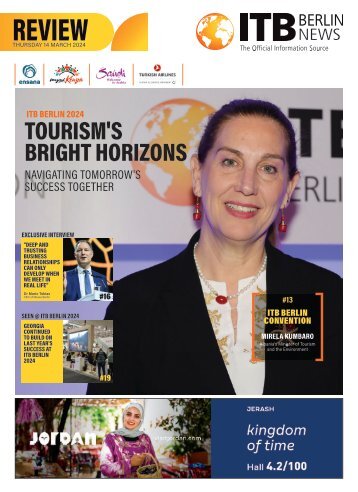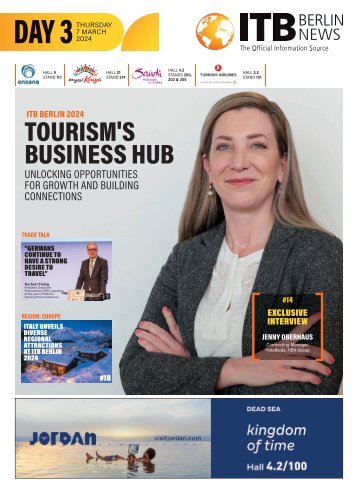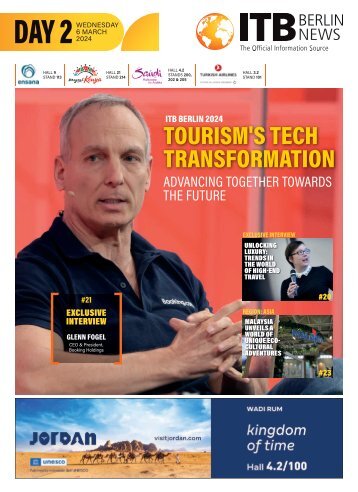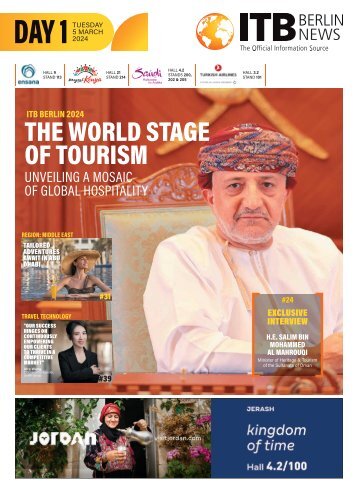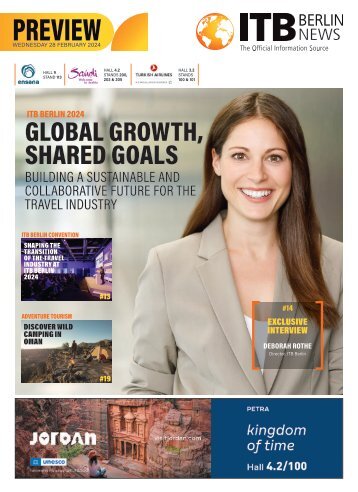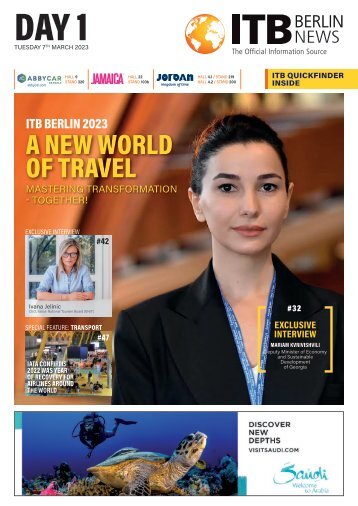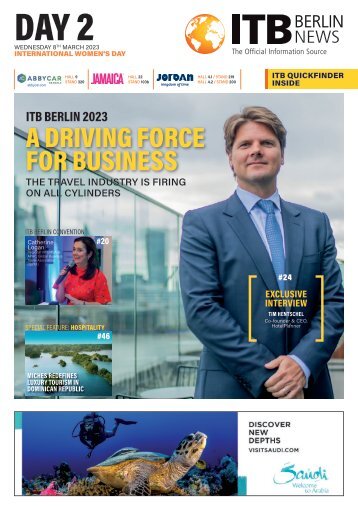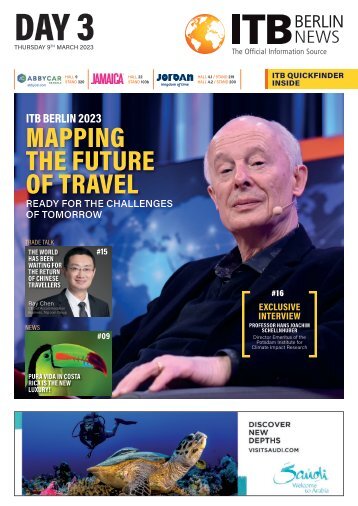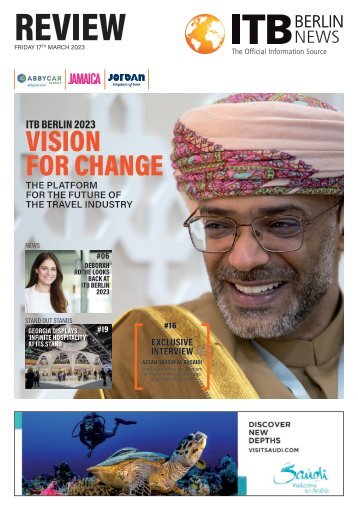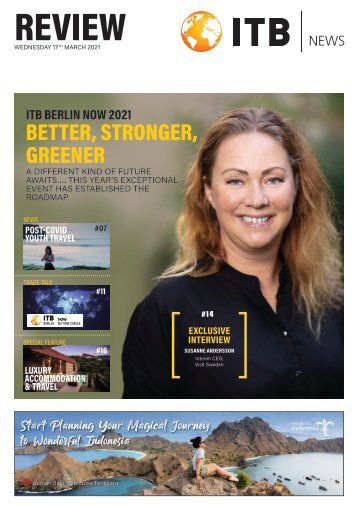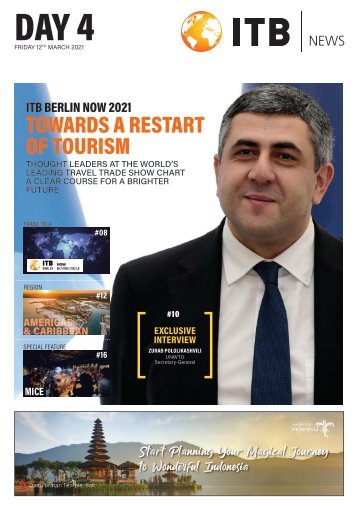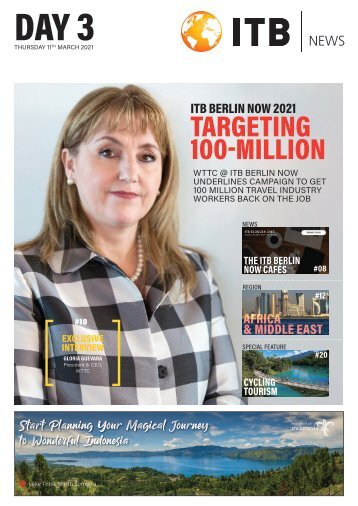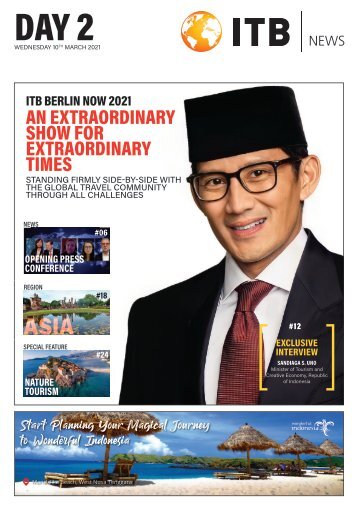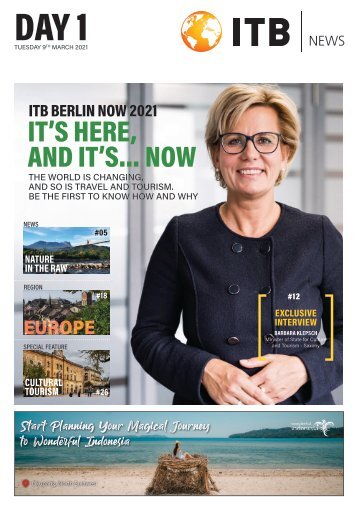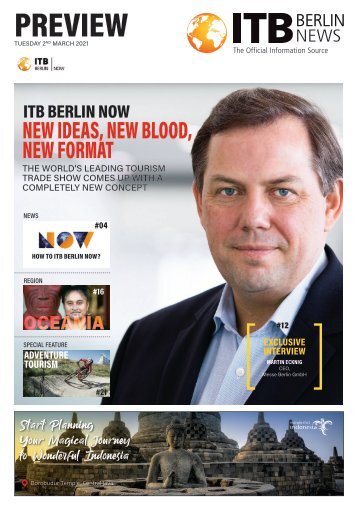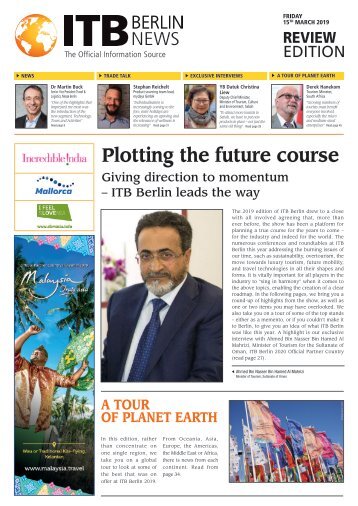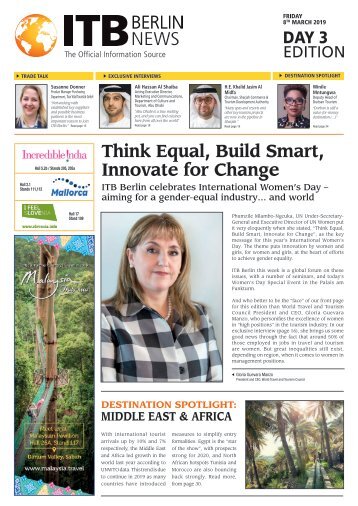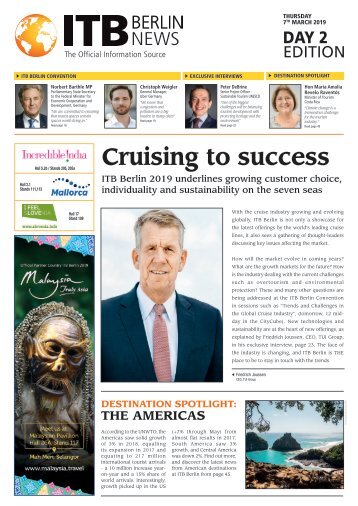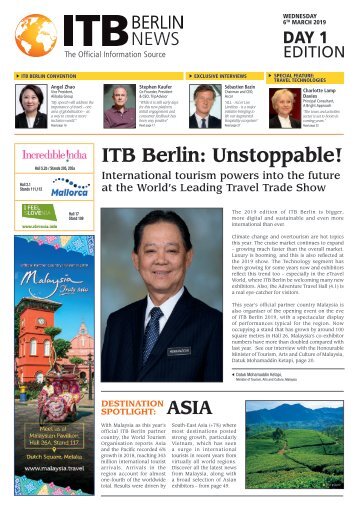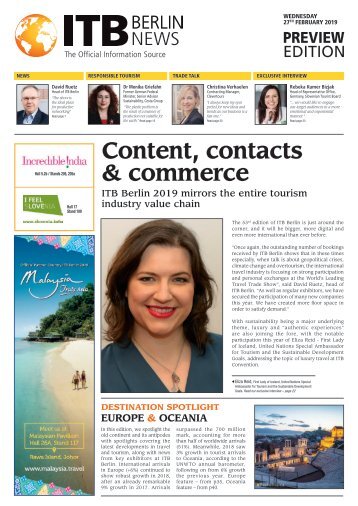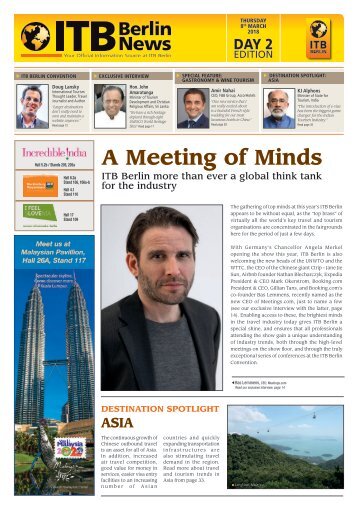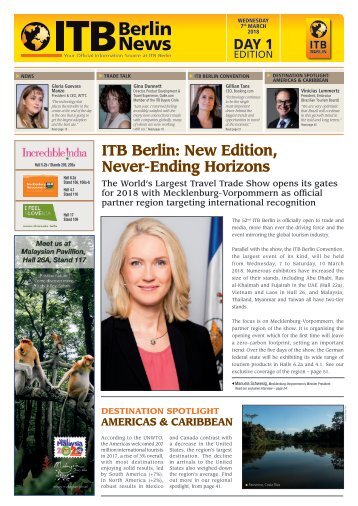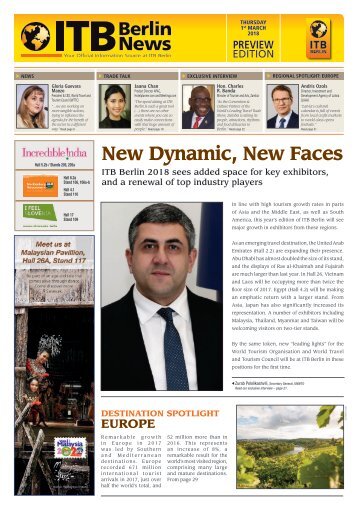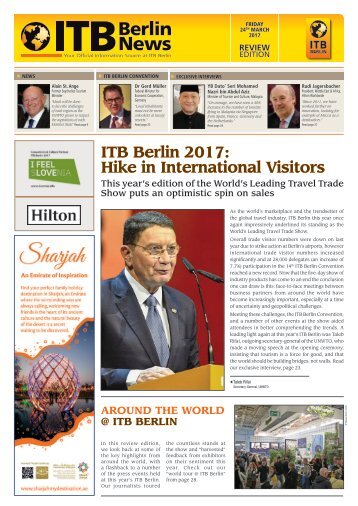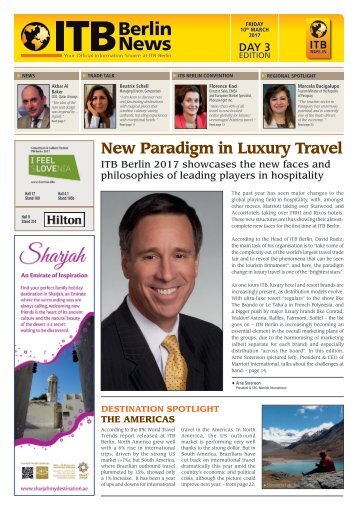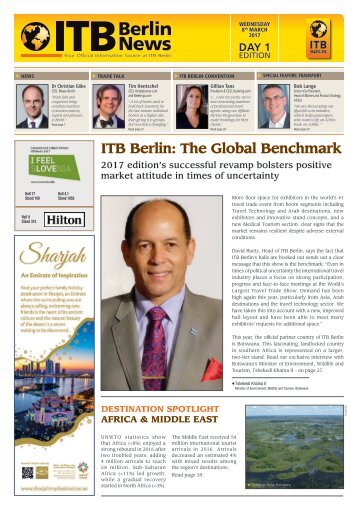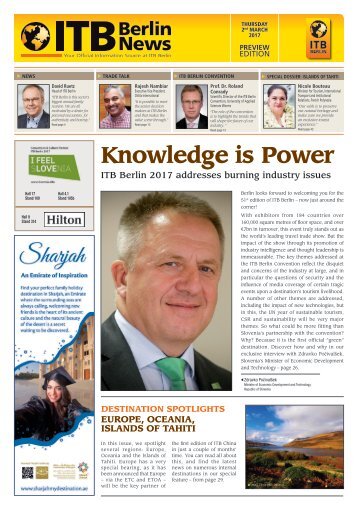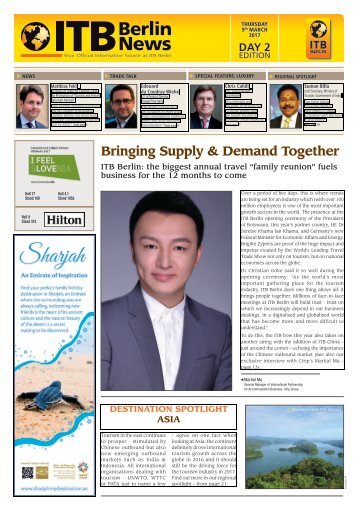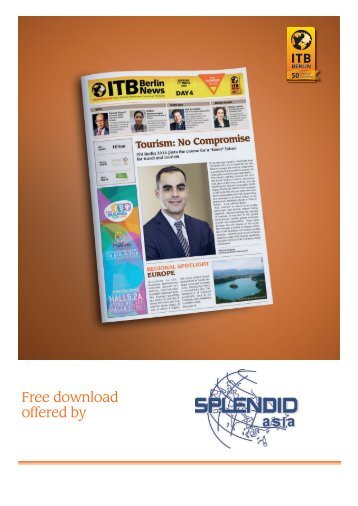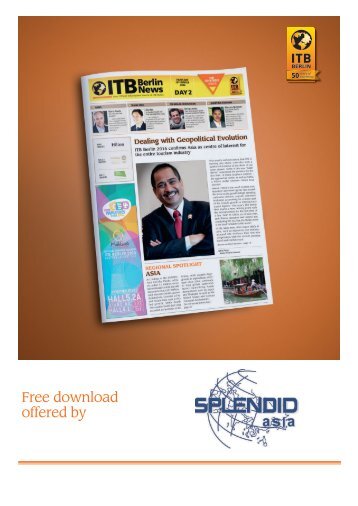
ITB Berlin News - Day 2
- Text
- Hotels
- Tourism
- Tours
- Resort
- Berlin
- Resorts
- Tourismus
- Halle
- Exhibitors
- Aussteller
14 ITB
14 ITB BERLIN CONVENTION DIGITAL VS. REAL VALUES At the CEO Panel on the topic of “Design flashes, digitisation or sustainable values?” young trendsetters are able to have their say. Hubert Viriot, chief executive officer of Yotel and Gesine Haag, digital entrepreneur and founder of barefoot living, are proof of how the hospitality industry can successfully reinterpret consumer trends and desires found in other sectors. Digitisation is the topic of the final panel discussion at the 10th ITB Hospitality Day. Its thought-provoking title is “IT takes over the hotel industry: how software and internet distributors are shaking up the industry”. Taking part in the debate will be Vassilis Syropoulos, founder and director of the software company Juyo Analytics; Peter Verhoeven, managing director, EMEA, of Booking.com; Brannon Winn, vice president of Business Development EMEA of Sabre Hospitality Solutions; as well as Luis del Olmo, EVP Group Marketing & Asia Pacific at Meliá Hotels International and executive chairman of IDISO. Wilhelm Konrad Weber, partner of Swiss Hospitality Solutions, will moderate the event. DESIGN FLASHES, DIGITISATION OR SUSTAINABLE VALUES? Category: Future, Hospitality, Marketing Date: March 5, 2015 Time: 2:15 p.m. - 3:15 p.m. Location: Hall 7.1 A, Auditorium London Luxury and Budget Concepts Booming ITB Berlin Celebrates 10 th Year of “Hospitality Days” – forging the way forward thanks to thought leaders Cyber attacks, the sharing economy, luxury, lifestyle, budget hotels, digitisation and internet distribution are the topics at the 10th ITB Hospitality Day – admission is free for visitors to ITB Berlin. Today’s agenda once again features the latest topics and outstanding speakers are taking an in-depth look at future trends in the hospitality industry. “Check out – hack in”: more and more hotels now have to deal with the problem of internet hacking. On the opening day of the convention Stefan Hölzner, senior manager, and Dr. Florian Kohlar, representing KPMG Security Consulting, is giving a live demonstration of how to guard against cyber attacks. These two specialists take a look at security loopholes, showing how hackers steal customer data, copy bank cards and break into video conference systems. Another trend with the potential to change the hospitality industry is the sharing economy. Traveller information is becoming more and more accessible, something that online providers are exploiting by analysing big data. However, the sharing economy is also a big force driving tourism trends. Can the conservative hospitality industry still keep up? What business models do they have lined up, and can they accommodate the sharing economy? These are the questions that Robert Wissmath, managing director of DICON Marketing und Beratungsgesellschaft, Berlin; Michael Hartmann, senior executive advisor on the executive board of Ecole Hôtelière de Lausanne; Marco Nussbaum, chief executive officer of the progressive prizeotel chain and Marcus Bernhardt, the group chief commercial officer of Europcar in Paris, are debating at a panel discussion moderated by Wirtschaftswoche reporter Hans-Jürgen Klesse. Simultaneous demand for two opposing lifestyles has today also become a dominant force: a desire for luxury and for budget accommodation. How can a hotel establish a (new) position in an age in which nothing is certain? Hotel chains are bombarding their customers with more and more lifestyle brands. The boom in budget designer hotels has created a desire for chic and stylish living, particularly with the younger, mobile generation. However, satisfying the demand for low cost and lifestyle creates confusion with services, prices and quality. Where does one draw the line between these hotels and the upmarket or even luxury segment? At an event moderated by Claudia Roth, advisor for Luxury Brands and managing partner of Totally Indispensable, Emile Bootsma, managing director of Hotel Adlon Kempinski Berlin; Michael Struck, chief executive officer of the recently established Ruby Hotels and Dina Soliman, director, ITB Berlin Convention 2014 ITB Hospitality Day Brand Management Europe of the InterContinental Hotel Group, are discussing ’Luxury & lifestyle, budget & lifestyle: a global attitude towards life turns the conventional hotel industry model upside down’. HOSPITALITY DAY Category: Future, Hospitality, Marketing Date: March 5, 2015 Time: 10:30 a.m. - 4:30 p.m. Location: Hall 7.1 A, Auditorium London ITB BERLIN NEWS • Thursday 5 th March 2015 www.itb-berlin-news.com
ITB BERLIN CONVENTION 15 Escaping the Mass-Produced, Uniform Accommodation Experience Keynote Executive Interview – Megatrend Sharing Economy: Disruptive Technologies, New Business Models And Industry Structures In The Hotel Industry In the first phase, the disruptive force of internet revolutionised global travel sales. Will a reorganization of the production side now follow, in which the hotel industry will experience intense competition from private accommodations? What influence do “disruptive technologies” have on the current industry structures and how will the Sharing Economy continue to develop? Which new business models are to be expected, and is the Sharing Economy also relevant in the Business Travel sector? In this morning’s keynote interview, Philip C. Wolf, Founder, Phocuswright Inc., will put these and a number of questions to Olivier Grémillon, Managing Director EMEA, Airbnb. We caught up with Olivier in preparation for the conference and asked, firstly, what is changing in the way people interact… Is it a change of paradigm? The concept of home sharing is not new, cities used to be villages and people have been staying in private homes for centuries. What is changing is the technology that enables people to get WE OFTEN FIND THAT WE CAN ALLAY PEOPLE’S CONCERNS BY COMING TO THESE EVENTS AND EXPLAINING HOW OUR MODEL WORKS access to places all around the world. Now trust, mediated by technology, is making a comeback. It’s what’s motivating millions of people around the world to book a place to stay with someone they haven’t met before. In just over 7 years, more than 26 million guests travelled with Airbnb. Hundreds of thousands of ordinary people with extraordinary stories have become Airbnb hosts and opened their homes to travellers in 190 countries and 34.000 cities. 56 percent of these guests staying on Airbnb on a recent weekend were doing so for their first time. That’s because the rewards you get from Airbnb aren’t just financial - they’re personal - for hosts and guests alike. Why is Airbnb gaining in success so rapidly? The roots of Airbnb are in the 2008/9 economic crisis where it emerged as a great way not only for people to make extra money from spare space, but also as a more affordable accommodation option. Airbnb nowadays is about much more than saving money. It meets a need for people who want a different, more unique travel experience. Each of the 1 million homes on Airbnb is different and in many cases located outside of traditional tourist areas. So we see Airbnb as part of a trend, which is moving away from a mass-produced, uniform accommodation experience. How do you see the future? Airbnb has shown a consumer demand for more authentic and unique places to stay when they travel. We believe this could also apply across other areas of the trip where consumers don’t simply want the same experience that every other visitor to a city has. We also believe that accommodation is one part of the overall trip and that Airbnb could have a role to play in other aspects of the trip experience. How important do you feel the ITB Berlin convention is for promoting thought leadership in this respect? ITB Berlin is one of the most important events for the entire global travel industry. We want to be an active participant in the travel sector and conventions like this are a great way for us to make connections and meet potential partners. Olivier Grémillon Managing Director EMEA, Airbnb What kind of people should attend your presentation? The sharing economy isn’t only a niche phenomenon. It is already part of our daily life. There’s a lot of misunderstanding and misperceptions around our business and the sharing economy in general. But we think it is important for people to understand how the sharing economy is revolutionizing the way we live. We often find that we can allay people’s concerns by coming to these events and explaining how our model works. So if anyone isn’t sure what to make of the sharing economy or is concerned about it, come to the panel and we can hopefully address these concerns. MEGATREND SHARING ECONOMY: DISRUPTIVE TECHNOLOGIES, NEW BUSINESS MODELS AND INDUSTRY STRUCTURES IN THE HOTEL INDUSTRY Category: Future, Hospitality, Marketing Date: March 6, 2015 Time: 10:50 a.m. - 11:15 a.m. Location: Hall 7.1 A, Auditorium London ITB BERLIN NEWS • Thursday 5 th March 2015
- Page 1: THURSDAY 5 th MARCH 2015 ITB QUICKF
- Page 6 and 7: 6 NEWS Taleb Rifai at ITB Berlin UN
- Page 8: 8 NEWS Rewarding Positive Transform
- Page 11 and 12: NEWS 11 © Dmitry A. Mottl Panorama
- Page 13: NEWS 13 Paradise Found: Aircalin Pu
- Page 17 and 18: EXCLUSIVE INTERVIEW 17 Guest: Darre
- Page 19 and 20: CRUISES SPECIAL FEATURE 19 Take A C
- Page 22 and 23: 22 SPECIAL FEATURE GOLF TOURISM Cit
- Page 25 and 26: This Luxury Travel Feature is proud
- Page 27: This Luxury Travel Feature is proud
- Page 30 and 31: 30 SPECIAL FEATURE ADVERTORIAL LUXU
- Page 32 and 33: 32 REGION ADVERTORIAL AMERICAS Stre
- Page 34 and 35: 34 REGION ADVERTORIAL AMERICAS “T
- Page 36 and 37: 36 REGION AMERICAS Rio de Janeiro O
- Page 38: 38 WHERE TO GOIN BERLIN Alexa Berli
- Page 42 and 43: EXHIBITION GROUNDS GELÄNDEPLAN Hal
- Page 44 and 45: SHUTTLE BUSSES & FAIRGROUND SHUTTLE
- Page 46 and 47: SERVICES SERVICE Airports Informati
- Page 48 and 49: EXHIBITORS FROM A TO Z AUSTELLER VO
- Page 50 and 51: EXHIBITORS FROM A TO Z AUSTELLER VO
- Page 52: EXHIBITORS FROM A TO Z AUSTELLER VO
- Page 55 and 56: D / E / F EXHIBITORS / AUSSTELLER H
- Page 57 and 58: F / G / H EXHIBITORS / AUSSTELLER H
- Page 59 and 60: H / I / J / K EXHIBITORS / AUSSTELL
- Page 61 and 62: K / L / M EXHIBITORS / AUSSTELLER H
- Page 63 and 64: M / N / O EXHIBITORS / AUSSTELLER H
- Page 65 and 66:
O / P / Q / R EXHIBITORS / AUSSTELL
- Page 67 and 68:
R / S EXHIBITORS / AUSSTELLER HALL
- Page 69 and 70:
S / T EXHIBITORS / AUSSTELLER HALL
- Page 71 and 72:
T / U / V EXHIBITORS / AUSSTELLER H
Inappropriate
Loading...
Mail this publication
Loading...
Embed
Loading...
